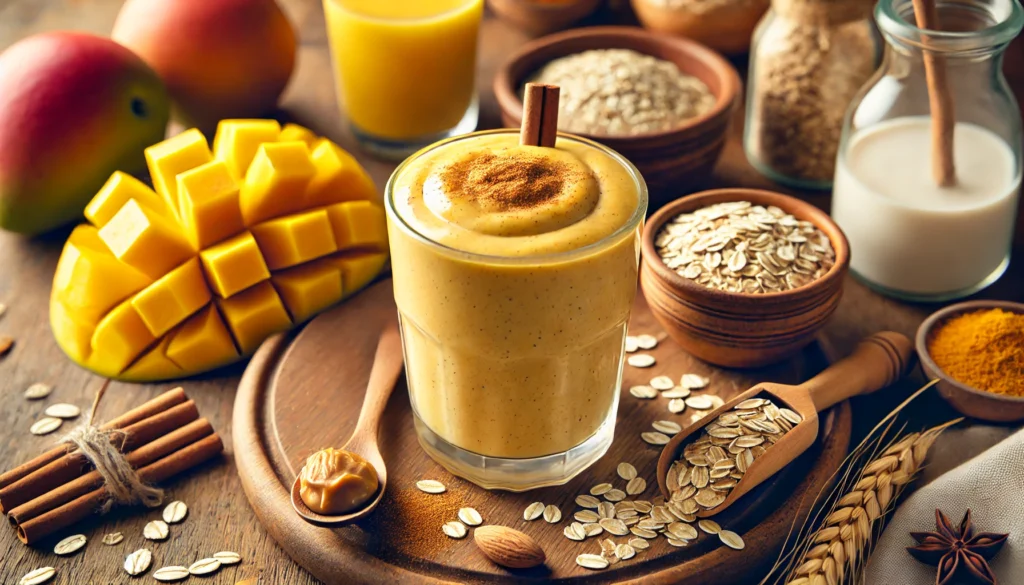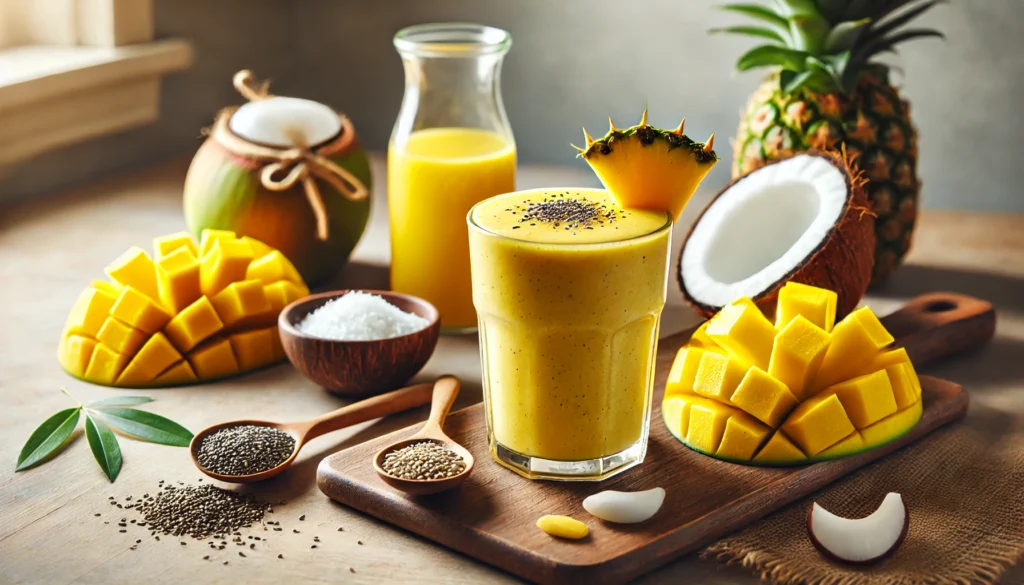Glycogen is the primary energy reserve stored in the muscles and liver, essential for sustaining endurance and supporting recovery after physical activity. When glycogen levels are depleted post-exercise, consuming carbohydrates can help replenish these stores efficiently. Mango, a naturally sweet and nutrient-dense fruit, serves as an excellent source of quick-digesting carbohydrates while also offering vitamins, minerals, and antioxidants. Paired with complementary ingredients, mango smoothies provide an ideal balance of energy replenishment, hydration, and muscle recovery. In this article, we’ll explore five delicious mango-based smoothie recipes designed to restore glycogen levels and enhance post-workout recovery.
1. Mango-Banana Glycogen Booster
This simple and creamy smoothie is a perfect post-workout energy drink, combining mango and banana for fast-digesting carbohydrates that replenish glycogen quickly.
Ingredients:
- 1 cup ripe mango (fresh or frozen)
- 1 banana (frozen for extra creaminess)
- 1 cup almond milk (or any preferred milk)
- 1 tablespoon honey (optional, for extra sweetness)
- ½ teaspoon vanilla extract
- ½ cup ice
Instructions:
- Add all ingredients to a blender.
- Blend until smooth and creamy.
- Pour into a glass and enjoy immediately.
Why it Works: Mango and banana provide quick-digesting sugars to restore glycogen levels, while almond milk offers a light, hydrating base.
2. Tropical Mango-Protein Shake
For those seeking protein-packed post-workout nutrition, this smoothie includes Greek yogurt, which helps repair muscle fibers while mango replenishes glycogen levels.
Ingredients:
- 1 cup mango chunks
- ½ cup Greek yogurt
- 1 cup coconut water
- 1 tablespoon chia seeds
- ½ teaspoon turmeric (for added anti-inflammatory benefits)
- ½ cup ice
Instructions:
- Blend all ingredients until smooth.
- Adjust sweetness if necessary by adding a teaspoon of honey.
- Serve chilled and enjoy.
Why it Works: Mango restores energy reserves, while Greek yogurt provides protein for muscle repair and coconut water supplies electrolytes for hydration.

3. Mango-Oatmeal Energy Smoothie
This fiber-rich smoothie is perfect for sustaining energy levels throughout the day, combining mango with complex carbohydrates from oats for gradual glycogen replenishment.
Ingredients:
- 1 cup mango chunks
- ½ cup rolled oats (pre-soaked in water or milk for 5 minutes)
- 1 tablespoon almond butter
- 1 cup oat milk
- 1 teaspoon cinnamon
- ½ teaspoon ground flaxseeds
- ½ cup ice
Instructions:
- Blend all ingredients until smooth.
- Pour into a glass and enjoy.
Why it Works: Oats provide complex carbohydrates for sustained energy, while mango quickly replenishes glycogen for immediate recovery.
4. Green Mango-Spinach Smoothie
For those seeking a nutrient-packed recovery smoothie, this antioxidant-rich blend combines mango with leafy greens and healthy fats to reduce inflammation and support glycogen restoration.
Ingredients:
- 1 cup mango chunks
- 1 cup fresh spinach
- ½ avocado
- 1 cup coconut milk
- Juice of ½ lemon
- ½ teaspoon ginger (optional, for extra digestion support)
- ½ cup ice
Instructions:
- Blend all ingredients until fully combined.
- Serve chilled and enjoy.
Why it Works: Spinach adds iron for muscle oxygenation, avocado supplies healthy fats for sustained energy, and mango restores glycogen levels quickly.
5. Mango-Coconut Recovery Smoothie
This tropical smoothie offers a perfect electrolyte-replenishing drink, combining mango with coconut water for hydration and pineapple for digestive support.
Ingredients:
- 1 cup mango chunks
- 1 cup coconut water
- ½ cup pineapple chunks
- 1 tablespoon hemp seeds (for added protein and omega-3s)
- ½ teaspoon honey (optional)
- ½ cup ice
Instructions:
- Blend all ingredients until smooth.
- Pour into a glass and enjoy.
Why it Works: Mango and pineapple restore glycogen levels, while coconut water provides essential electrolytes for hydration and recovery.

Why Mango for Glycogen Restoration?
Mango is an excellent source of quick-digesting carbohydrates, making it ideal for replenishing glycogen levels post-workout. The natural sugars (glucose and fructose) in mango are efficiently absorbed, ensuring fast energy recovery. Additionally, mango is packed with vitamin C, vitamin A, and potassium, which support muscle function, immune health, and inflammation reduction. Its high fiber content also promotes gut health, aiding digestion and nutrient absorption, which is crucial for efficient recovery.
Incorporating Mango Smoothies into Your Routine
Mango-based smoothies are an excellent pre-workout energy boost or post-workout recovery drink. Drinking a mango smoothie within 30 minutes of exercise helps restore glycogen levels efficiently while providing essential hydration and nutrients. Additionally, combining mango with protein sources like Greek yogurt or nut butter ensures muscle repair while healthy fats from avocado or flaxseeds provide long-lasting energy. Whether used as a meal replacement, an afternoon snack, or a post-exercise drink, these mango smoothies offer a delicious and effective way to support recovery and performance.
Further Reading:
Recovery after exercise: what is the current state of play?
Influence of 2 Weeks of Mango Ingestion on Inflammation Resolution after Vigorous Exercise
Mango After Workout: The Perfect Post-Exercise Fuel for Optimal Recovery
The content provided on Smoothie Professor is for informational and educational purposes only and is not intended as medical advice, diagnosis, or treatment. Readers are encouraged to consult a qualified healthcare professional before making any changes to their diet, exercise routine, or lifestyle, particularly if they have existing health conditions or specific dietary needs. While every effort is made to ensure the accuracy of the information presented, Smoothie Professor and its contributors do not guarantee the completeness, reliability, or suitability of any information or recipes for individual needs. Use of the content is at your own risk, and Smoothie Professor expressly disclaims liability for any adverse effects, claims, or damages arising from the use of the information or recipes provided on this website.
